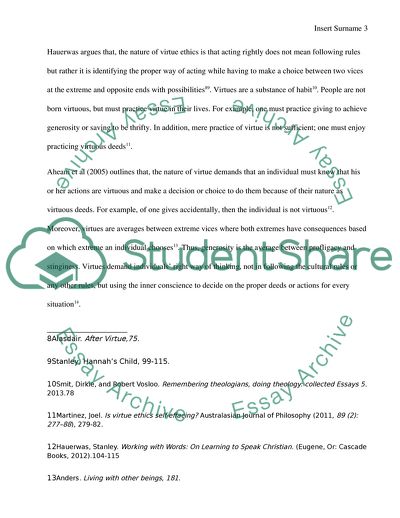Cite this document
(Virtue Ethics in Christianity Literature review Example | Topics and Well Written Essays - 1750 words, n.d.)
Virtue Ethics in Christianity Literature review Example | Topics and Well Written Essays - 1750 words. https://studentshare.org/religion-and-theology/1844640-with-reference-to-both-alasdair-macintyre-and-stanley-hauerwas-provide-a-critical-account-of-the-nature-and-potential-of-virtue-ethics-for-the-contemporary-christian-church-and-how-virtue-ethics-relates-to-the-protestant-tradition-of-biblical-interpreta
Virtue Ethics in Christianity Literature review Example | Topics and Well Written Essays - 1750 words. https://studentshare.org/religion-and-theology/1844640-with-reference-to-both-alasdair-macintyre-and-stanley-hauerwas-provide-a-critical-account-of-the-nature-and-potential-of-virtue-ethics-for-the-contemporary-christian-church-and-how-virtue-ethics-relates-to-the-protestant-tradition-of-biblical-interpreta
(Virtue Ethics in Christianity Literature Review Example | Topics and Well Written Essays - 1750 Words)
Virtue Ethics in Christianity Literature Review Example | Topics and Well Written Essays - 1750 Words. https://studentshare.org/religion-and-theology/1844640-with-reference-to-both-alasdair-macintyre-and-stanley-hauerwas-provide-a-critical-account-of-the-nature-and-potential-of-virtue-ethics-for-the-contemporary-christian-church-and-how-virtue-ethics-relates-to-the-protestant-tradition-of-biblical-interpreta.
Virtue Ethics in Christianity Literature Review Example | Topics and Well Written Essays - 1750 Words. https://studentshare.org/religion-and-theology/1844640-with-reference-to-both-alasdair-macintyre-and-stanley-hauerwas-provide-a-critical-account-of-the-nature-and-potential-of-virtue-ethics-for-the-contemporary-christian-church-and-how-virtue-ethics-relates-to-the-protestant-tradition-of-biblical-interpreta.
“Virtue Ethics in Christianity Literature Review Example | Topics and Well Written Essays - 1750 Words”. https://studentshare.org/religion-and-theology/1844640-with-reference-to-both-alasdair-macintyre-and-stanley-hauerwas-provide-a-critical-account-of-the-nature-and-potential-of-virtue-ethics-for-the-contemporary-christian-church-and-how-virtue-ethics-relates-to-the-protestant-tradition-of-biblical-interpreta.


